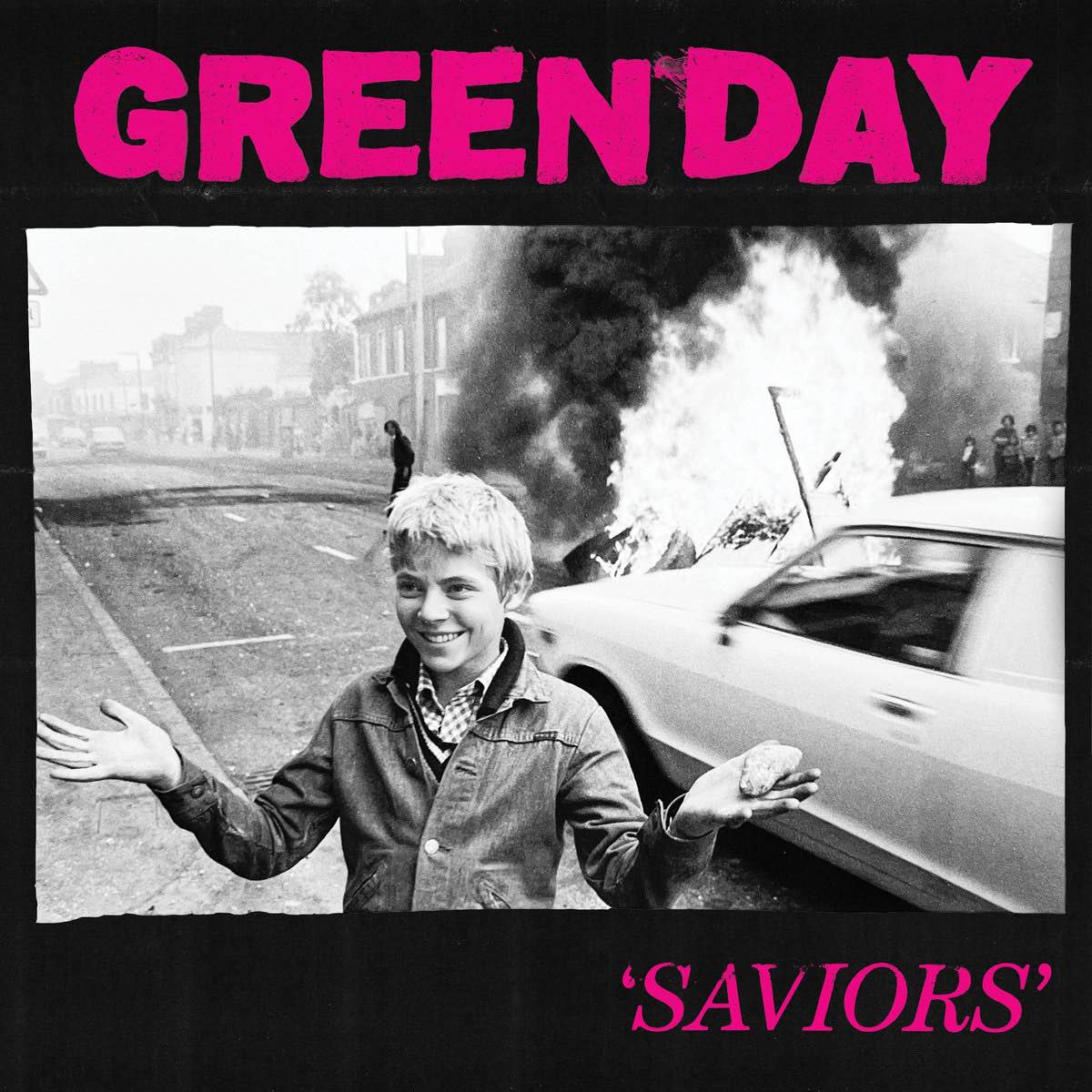Green Day
Saviors
REPRISE
Whether Green Day can be considered a true “punk” band is a tired discussion that won’t be revisited here, except to say that they started out as one and no longer are. But that doesn’t mean their lips are sealed on the matter, with Billie Joe Armstrong’s incendiary comments about former (and, lord willing, hopefully not future) President Trump at the band’s recent concerts making headlines and (possibly inadvertently) promoting their new album Saviors, which contains a handful of songs with a punk spirit but continues the trio’s decades-long drift toward rock music with even broader (ahem, “commercial”) appeal.
Green Day’s breakthrough record, 1994’s 10-times-platinum Dookie, caught the interest of the masses due in part to the band’s flip take on mental health issues. The consummate catchiness and cleverness of “Basket Case,” “Welcome to Paradise,” and other runaway hits went viral before social media even existed. In one of the most lasting portraits of the artists as young men, throngs numbering in the tens of thousands rioted at a free concert in Boston (the first-ever show attended by yours truly), prompting Green Day to bolt from the stage and end the show early.
Green Day became a household name around the same time, although their popularity culminated in 2004’s American Idiot. The album sold fewer copies than Dookie but became part of the national dialogue thanks to pro-Iraq war media personalities despising it, while an accompanying musical likely roped in a new legion of fans at the dawn of the Obama years. At the same time, Green Day had—starting with 1997’s Nimrod—expanded their sound drastically: 2016’s Revolution Radio was a pop record, even though it touched on cultural flashpoints like mass shootings and social media; on its successor, 2020’s Father of All…, Green Day gave garage rock a bearhug. Armstrong, bassist Mike Dirnt, and drummer Tré Cool had fully realized themselves as not just bratty blowhards challenging The Man, but rather maturing musicians equally interested in challenging their fans with new flavors.
That brings us to Saviors, which finds Green Day in a strange new world where hatred of institutions, the establishment, and politicians drooling over the prospects of authoritarianism have fully taken root in the US. The punk-rock community now finds itself as uncomfortable bedfellows with the mainstream, due to many unexpectedly shared viewpoints on politics and social issues. John Goodman’s riotous and self-righteous sidecar hero in The Big Lebowski once voiced a primal, existential scream: “Has the whole world gone crazy?! Am I the only one around here who gives a shit about the rules?!” Now, what used to be a sentiment so fringe that it evoked laughter is expressed daily by Americans of all stripes.
Saviors finds Armstrong trying to make sense of it all while he and his bandmates continue pushing their project’s musical boundaries. “Strange days are here again / And it’s getting weirder,” Armstrong sings on “Dilemma.” Along with the equally catchy “One Eyed Bastard,” “1981,” and “Goodnight Adeline,” Green Day embed Saviors with easy-to-digest rock songs complemented by soft punk flourishes. Those particular tunes—plus “Bobby Sox,” a sing-along ditty—will be especially enjoyable for those who don’t know Green Day tourmates Weezer by heart, as Rivers Cuomo could’ve written them just as easily. (Also similar to Weezer, Green Day intersperse a few love songs to ensure their new record isn’t one-note, so to speak.) Indeed, Saviors furthers Green Day’s career-long obsession with power chords (which Armstrong cheekily admits on “Corvette Summer”).
As Saviors heads toward the finish line, Green Day pivot musically and thematically. The piano-infused “Father to a Son” is perhaps the most touching song the band has ever written, with Armstrong—a recovering addict—promising his child, “I’ll never break your heart.” Meanwhile, album closer “Fancy Sauce” is a downbeat, reflective soliloquy that proves Green Day’s musical chops are still at the ready when they get bored with their typical power-chord fare.
Poetically, that song also finds Armstrong appearing to settle his long-running internal debate over whether he’s nuts or if it’s the world around him that’s upside-down—a question he started asking way back with “Basket Case.” “I’m not crazy / You’re the one that’s crazy / Everybody’s crazy / Getting stoned and lazy / As we all die young someday,” he sings. Blasphemous as it’ll sound, those concluding remarks decisively show that Armstrong and his bandmates aren’t punks. They’re parents. Responsible citizens. Adults.









